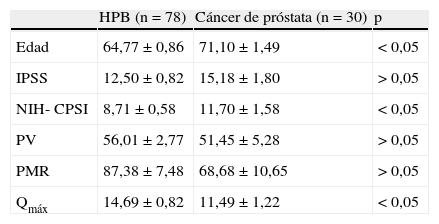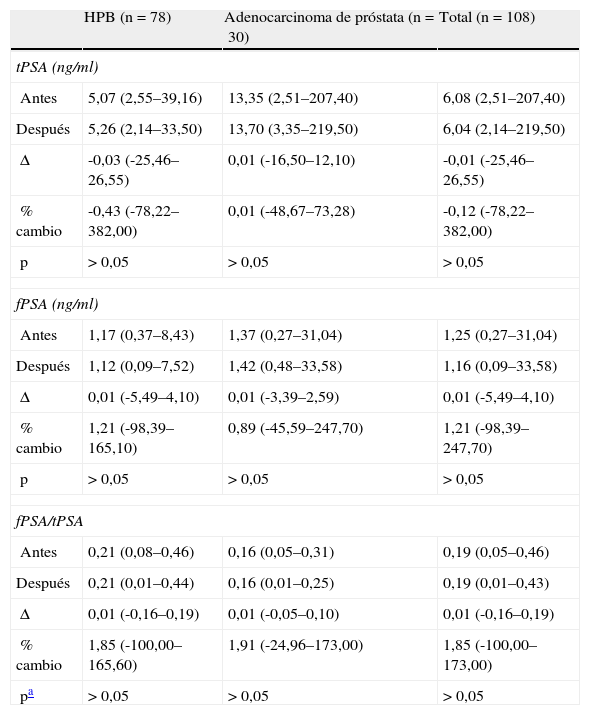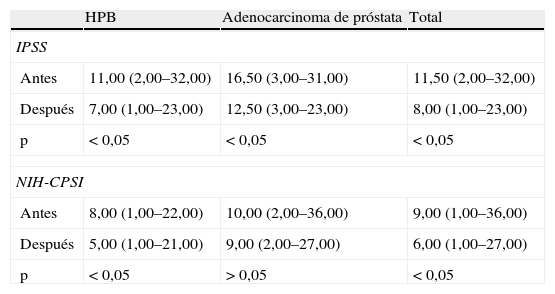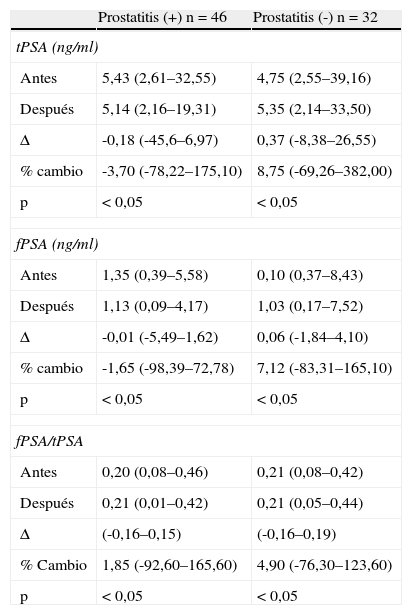Investigamos si la antibioterapia tiene algún papel en el PSA total (tPSA), PSA libre (fPSA) y fPSA/tPSA en pacientes con PSA superior a 2,5ng/ml. También si tiene alguna relación con la tasa de diagnóstico de cáncer de próstata.
Material y métodosUn total de 108 pacientes mayores de 50 años con síntomas del tracto urinario inferior y PSA>2,5ng/ml fueron incluidos en este estudio. Se dio antibioterapia a todos los casos durante tres semanas. Luego se tomó biopsias con guía ultrasonográfica a todos los pacientes. Antes y después de la antibioterapia se les aplicó los cuestionarios International Prostate Sypmtom Score (IPSS) y National Institute of Health Chronic Prostatitis Symptom Index (NIH-CPSI) y se comparó los valores de tPSA, fPSA y fPSA/tPSA en sangre.
ResultadosLas variaciones de tPSA, fPSA y fPSA/tPSA antes y después de la antibioterapia no mostraron diferencias estadísticamente significativas (p>0,05). Cuando excluimos el adenocarcinoma de próstata se hallaron diferencias estadísticamente significativas en las puntuaciones del IPSS y NIH-CPSI en todos los casos.
ConclusionesLa administración de antibioterapia a pacientes con niveles de PSA superiores a los valores de corte no produjo un cambio significativo en la decisión de realizar biopsias de próstata con aguja. Se debería considerar realizar biopsias de próstata sin antibioterapia previa en los pacientes con PSA elevado cuando no exista una sospecha de prostatitis.
We investigated if antibiotherapy has any role on total PSA (tPSA), free PSA (fPSA) and fPSA/tPSA ratio in patients with tPSA higher than 2.5ng/ml. We also analyzed if it has any relation with prostate cancer diagnosis rate.
Material and MethodsA total 108 patients older than 50 years of age with lower urinary system sypmtoms and tPSA >2.5ng/ml were included in this study. Antibiotherapy was given to all the cases for three weeks. After that, transrectal ultrasound-guided prostate biopsies were taken from all the patients. Before and after antibiotherapy, “The International Prostate Symptom Score” (IPSS) and “National Institutes of Health Chronic Prostatitis Symptom Index” (NIH-CPSI) questinories are performed and serum tPSA, fPSA and fPSA/tPSA values were obtained.
ResultsTPSA, fPSA and fPSA/tPSA ratio alterations prior to and after antibiotherapy did not show any statistically significant difference (p>0.05). When prostate adenocarcinoma was excluded, an statistically significant decrease was found in IPSS and NIH-CPSI scores for all cases.
ConclusionsAntibiotherapy given to patients with PSA levels higher than threshold value has not led to significant change in prostate needle biopsy decision. Prostate biopsy should be considered without trying antibiotherapy in patients with high PSA values if a suspicion of prostatitis does not exist.
Artículo
Comprando el artículo el PDF del mismo podrá ser descargado
Precio 19,34 €
Comprar ahora














